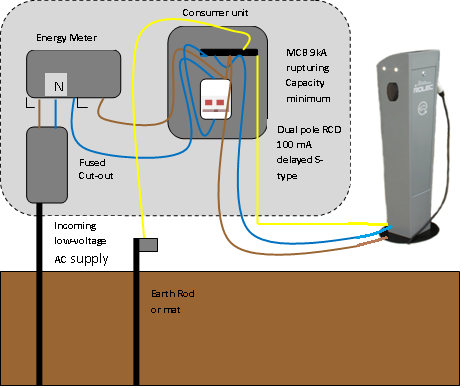St Andrews: 01334 850382
Glenrothes: 01592 654553
Email: info@rbgrant.co.uk
St Andrews: 01334 850382
Glenrothes: 01592 654553
Email: info@rbgrant.co.uk
 Electric Vehicles (EV) can be charged from a domestic socket or a charging point. Charging points are more efficient and will use less energy. A charging point has an additional current or connection system to disconnect the current when the vehicle is not on charge. RB Grant are approved EV charging point installers covering Scotland.
Electric Vehicles (EV) can be charged from a domestic socket or a charging point. Charging points are more efficient and will use less energy. A charging point has an additional current or connection system to disconnect the current when the vehicle is not on charge. RB Grant are approved EV charging point installers covering Scotland.
If the vehicle is plugged into a domestic socket and it is driven away, it could cause severe damage to the property’s electrics. Specified charging points have special features to help prevent damage to the electrics and your EV.
When an EV is plugged into a domestic socket to charge without protection, this can lead to an overload on the sockets. If the current load on the ring gets two high, other appliances plugged in may get damaged.
Another risk of using a domestic socket to charge your EV is that the wiring of the house may not be up to necessary standards due to old or faulty wiring. An electric vehicle will take up to 12 hours to charge on a domestic socket; unlike the fastest charging point that takes about 20 minutes.
R.B Grant can provide an appropriate solution to help reduce your carbon emissions with the installation of charging equipment for your electric car.
For example, if you touch a metal conductive part on your washing machine, a fault may occur which may electrocute you. This type of special protection is used in these type of devices to cut the power before any harm can be caused. R.B. Grant supply this protection for EV charging points to guarantee you maximum safety based on a TT protection.
The charging point and car also communicate by stopping the charging of the battery when the battery is fully charged in order to help prevent energy loss and reduce your energy bills.

R.B. Grant can supply clients with a variety of charging points to help meet all their requirements. R.B. Grant are approved installers of Elektromotive.
We are trying to expand the charging points throughout Scotland to help with the future of the environment. If you’re interested in EV and the installation of a dedicated charging point at your home or for your business, contact R.B. Grant or read about our installations here.
See here to read more about EV charging points and some of the different types of EV charging points available.
Click here to learn more about Electric Vehicles (EV's)










